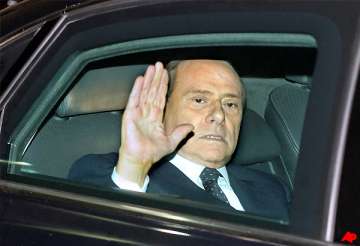Berlusconi Faces Future Of Legal, Business Woes
Rome, Nov 13: His legacy tarnished and his hopes of clinging to power dashed, Silvio Berlusconi faces daunting legal and financial challenges and the prospect of life outside the international spotlight now that he has

Rome, Nov 13: His legacy tarnished and his hopes of clinging to power dashed, Silvio Berlusconi faces daunting legal and financial challenges and the prospect of life outside the international spotlight now that he has left office.
He has vowed he won't run again for office, though few expect he'll abandon Italian politics for good. Berlusconi himself has already said he might help out a campaign here or there because, well, “they've always turned out well for me.”
But with Berlusconi's resignation as premier Saturday following months of market turmoil, a political era in Italy closes and the 75-year-old Berlusconi is just a billionaire businessman once again.
“What we are viewing now is not the end of a government, but the end of a system, of a political system,” said Massimo Franco, a political analyst for leading daily Corriere Della Sera.
Indeed, Berlusconi dominated Italian politics for the last 17 years, a polarizing figure who served three terms as premier. He held off political opponents and jousted with magistrates pursuing him on corruption and sexual misconduct charges, but was felled by massive international and market pressure.
The media mogul had thrived rubbing shoulders with the powerful, whether vacationing with Russia's Vladimir Putin or getting a taste of Texas ranch life when hosted by then President George W. Bush in a meeting of Iraq war allies.
But seen as an impediment to economic reform, his exit came quickly as Italy was swept up by Europe's debt crisis.
Whether he goes back to running his media empire or even returning to the vacant post as president of his beloved AC Milan soccer team, he faces an unpleasant agenda. Judging from how his media voices are reacting, it won't be a completely quiet exit.
“Stop a Europe of technocrats,” clamored a headline in the family newspaper Il Giornale of Italy's presumed new government headed by economist Mario Monti. “This government is a coup.”
Berlusconi's resignation will mean he can no longer claim official government business as a reason for missing hearings in his three trials, a tactic that has been used to delay proceedings. His attempt at fashioning a law that would have given him immunity was overturned by the Constitutional Court.
But charges in two Milan trials related to his business dealings will run out due to the statute of limitations early next year—leaving little peril that the billionaire would face any penalty even if courts can reach a conviction in the first trial. The Italian system allows for two levels of appeal.
Berlusconi is expected to testify before Christmas in his trial on charges of paying British lawyer David Mills to lie for him on the stand in another case. A verdict is expected in late January, but with the statute of limitations set to expire in March, it is impossible that two levels of appeal could be completed to make any verdict final.
Berlusconi has denied the charge, and Mills saw his conviction overturned on appeal.
In the other trial concerning his Mediaset media empire, Berlusconi is charged with tax fraud in the purchase of TV rights. Berlusconi denies the charges, which also expire in the spring.
In Berlusconi's most sensational trial, the 75-year-old is accused of paying for sex with a Moroccan teen—known by her nickname Ruby Rubacuore, “Ruby the Heartstealer”—and using his influence to cover it up. No fewer than 22 court dates have been scheduled through May.
A conviction would mean Berlusconi would be permanently barred from public office—but he has already pledged not to run again and his hopes of one day becoming Italian president were dashed by the sex scandal.
That leaves the billionaire back where he started: running his considerable empire. The economic crisis has made that more challenging.
Shares in Mediaset have lost half of their value since May, as the debt crisis lapped ever more perilously at Italian businesses, and dropped by as much as 10 percent in trading sessions this week as Berlusconi's political future was decided by the markets.
Mediaset—which is controlled by the family holding company Fininvest and includes private TV stations as well as newspapers and other publications—dropped from ¤4.242 a share in May to ¤2.142 on Friday.
“It could be that Berlusconi is very scared by the financial crisis. If you think that Fininvest is 95 percent invested in Italy,” said Carlo Guarnieri, a political scientist as the University of Bologna.
Even more dangerous was his loss of a civil suit to rival media group over corruption in the acquisition of the Mondadori publishing empire. A court has ordered him to ¤560 million ($800 million) for corrupting a judge.
Alarmed by the amount, Berlusconi went as far as quietly introducing a measure into Italy's austerity budget this summer that would have allowed the company to delay payment until the final appeal, but withdrew it after political opponents raised an outcry.
He can still count on friends in high places to look after his interests: his 41-year-old political heir, Angelo Alfano, now heads his People of Liberties party and he remains its founder.
But Franco, the Corriere della Sera analyst, said Berlusconi's future in the near-term is probably not on Italy's center political stage.
“I think Berlusconi can just survive, maybe with a personal party, but I don't think he is due to rule and lead Italy in the foreseeable future any more,” he said.